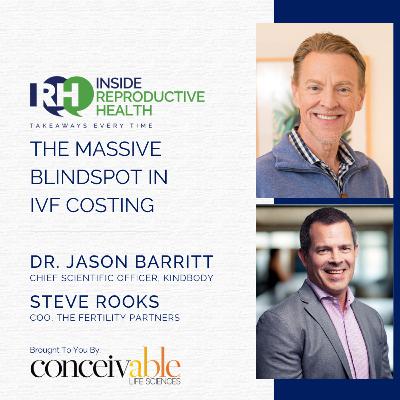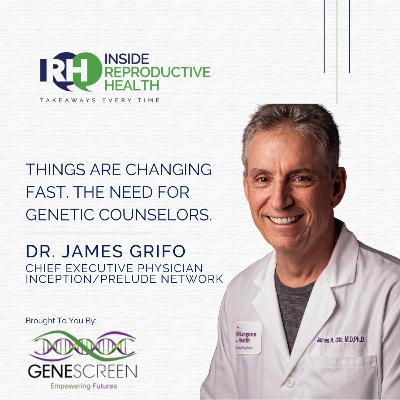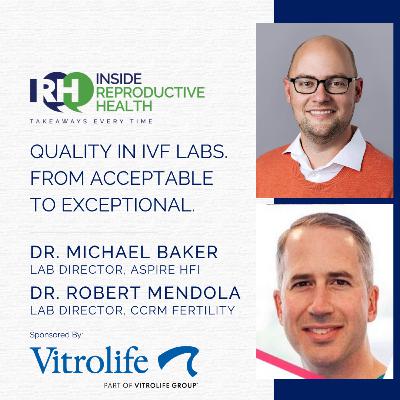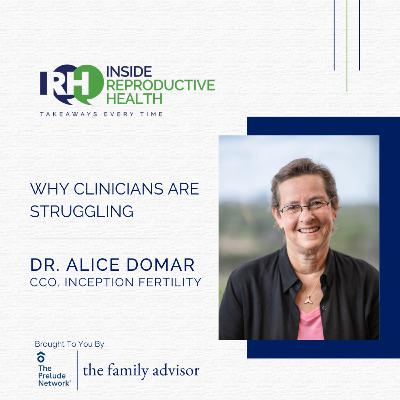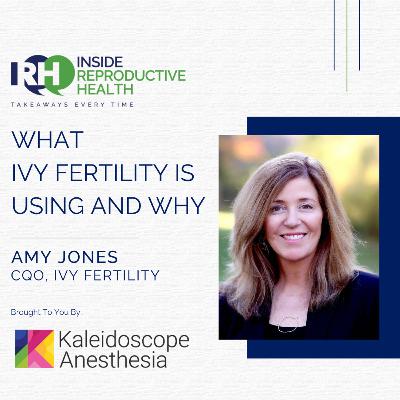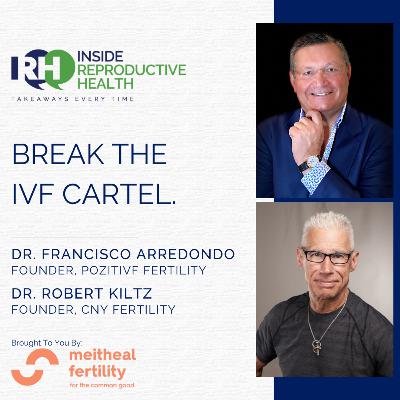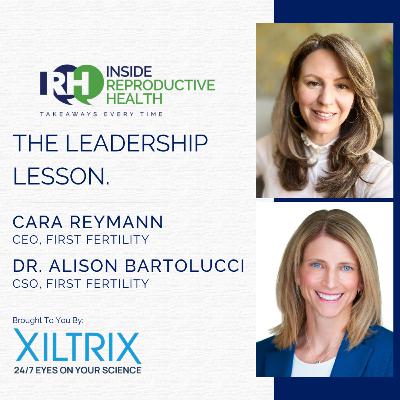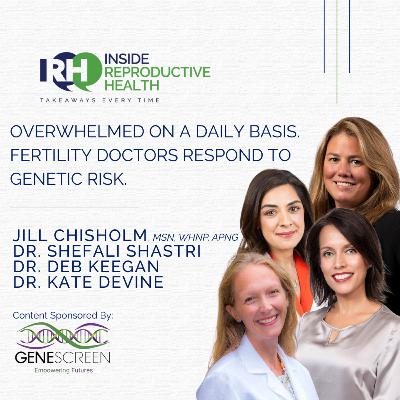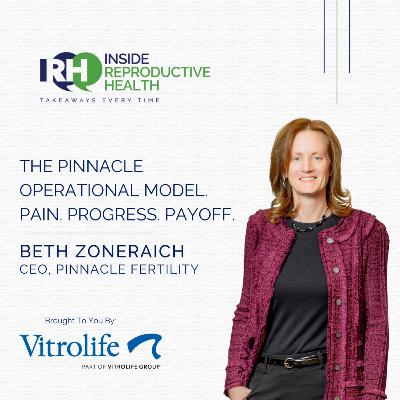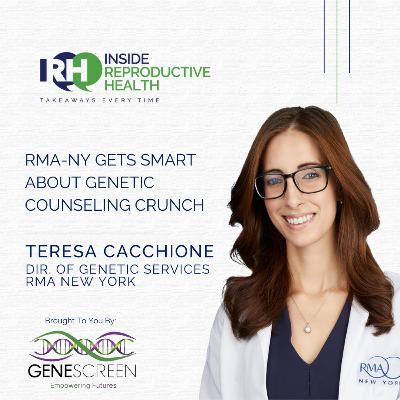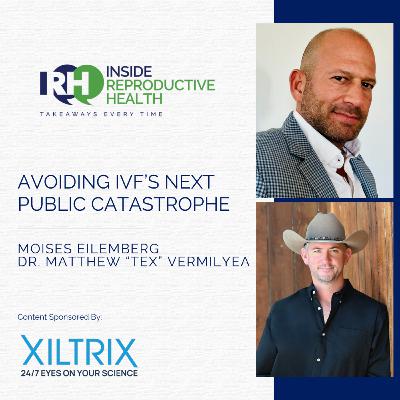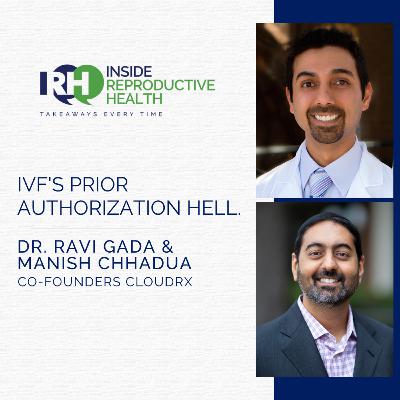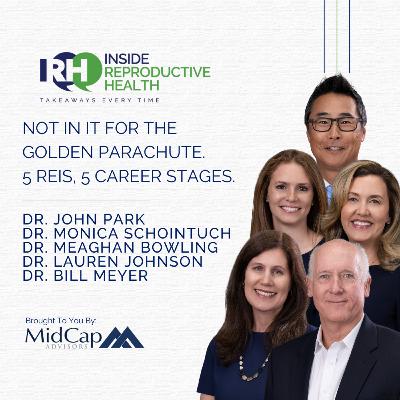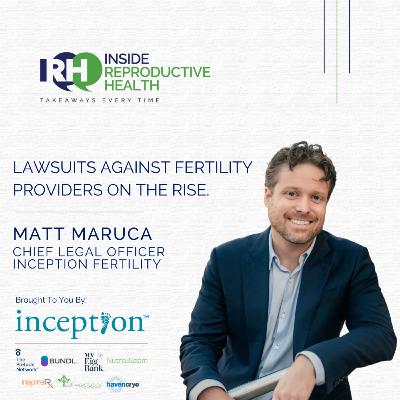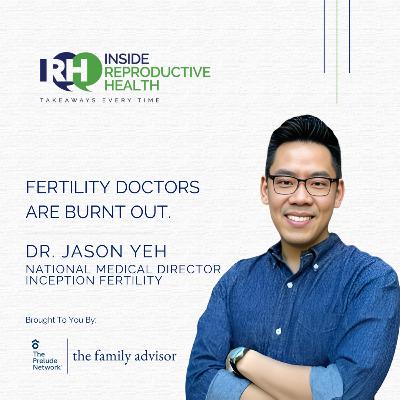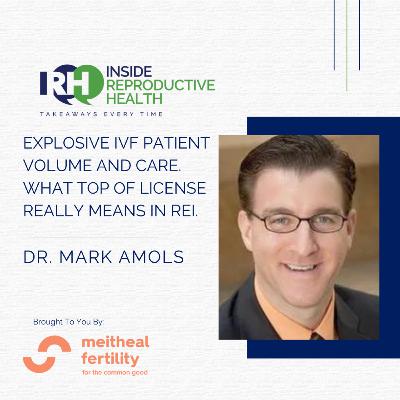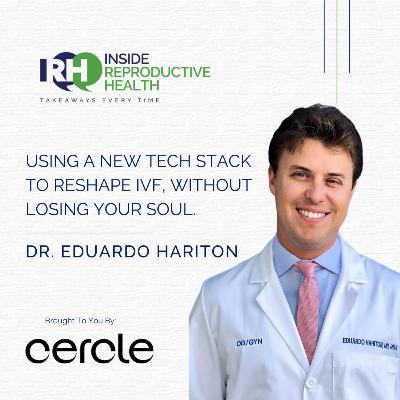Discover Inside Reproductive Health Podcast
Inside Reproductive Health Podcast

Inside Reproductive Health Podcast
Author: Fertility Bridge
Subscribed: 35Played: 1,004Subscribe
Share
© Fertility Bridge
Description
Inside Reproductive Health is your source for information about the growing field of fertility. Inside Reproductive Health features an active blog and weekly interviews with leaders from the clinical, investment, patient relations, and pharmaceutical corners of reproductive medicine. Be sure to subscribe to our podcast and check back frequently for new content!
278 Episodes
Reverse
How do large fertility networks retain great people when everyone is struggling to do the same?In this week’s episode of Inside Reproductive Health, Iris González, Chief Operating Officer of IVI RMA North America, to talks about how one of the largest fertility organizations in the country approaches retention, leadership, and patient experience at scale.Iris shares:How IVI RMA uses regular operator meetings to address retention across practicesThe dyad leadership model used throughout the organizationIVI RMA’s built-in backup staffing strategiesWhy IVI RMA implemented patient advisory councils (and how they act on the feedback)The operational changes they made to improve financial counselingHow IVI RMA tripled patient survey participation (While improving NPS)
How much does an IVF cycle cost?Seems like a simple question. But as this week’s guests explain, it’s not.The way most of us account for “an IVF cycle” hides how many individual work orders and variables are actually involved. That lack of clarity can distort cost, efficiency, and strategy.This week on Inside Reproductive Health, Griffin talks with Steve Rooks, co-author of a groundbreaking paper in JARG on activity-based costing in IVF, and Dr. Jason Barritt, Chief Scientific Officer at Kindbody, to unpack what’s really behind those numbers.Together, they discuss:– Why “an IVF cycle” isn’t a single service but a set of unique work orders– How retrieval volume, ICSI, and PGT each reshape the cost per cycle– The dramatic efficiency differences between labs performing 200 vs. 4,000 cycles per year– The growing impact of managed care on margins– How scalable systems like AURA from Conceivable Life Sciences could expand IVF access
“They expect us to be perfect.”That’s how Dr. Jamie Grifo, Chief Executive Physician of the Inception/Prelude Network, describes the expectations placed on reproductive endocrinologists from patients, payors, and policymakers alike.And while perfection may be impossible, preparation and partnership aren’t.He discusses:– Why NYU Langone has three in-house genetic counselors in their REI department– How they counseled over 700 new patients last year– What led to 300 PGT-M cycles out of 5,500 retrievals– The challenges of sharing counselors across a growing network– Regulatory complexities from state and federal oversight– Why some REIs may be missing key opportunities to help patients with mosaic embryos
Embryologists have a lot riding on the line.Bad supplies can cause big problems. Good supplies can create big improvements.Either way, success rates and patients’ lives hang in the balance. Every detail in the IVF lab matters. “Good enough” can cost more than it saves, because only the highest standards protect consistency, outcomes and trust.. We’re joined this week by two of the most respected leaders in embryology. Dr. Michael Baker, Lab Director at Aspire HFI, and Dr. Robert Mendola, Lab Director at CCRM and member of the network’s Innovation Advisory Board.Together, they break down:– The full chain of quality assurance, from suppliers to networks to individual lab– The burden and importance of retesting lab materials– Why labs should evaluate not just blastocyst formation but cell counts per blast– The tension between cost control, standardization, and lab autonomy– The suppliers and products that stand out for exceptional quality (including Vitrolife’s media and oils)– Why transparency and competition should set the standard for lab supply quality (instead of regulation)
How are clinicians doing?Patients are expecting more, offering less gratitude, and leaving negative reviews faster than ever. Sound familiar?Dr. Alice Domar, Chief Compassion Officer at Inception, talks about the emotional toll of working in reproductive medicine and what can be done about it.Dr. Domar shares:– Practical strategies for burnout prevention– The one small intervention proven to improve patient retention– Results from three psycho-social trials currently underway at Inception– The patient traits most predictive of treatment dropout– How Inception Fertility supports providers through empathic communication training- What needs to change to better support front-line fertility professionals.
What will the IVF lab look like in five years?Trying to predict and shape that response is Dr. Denny Sakkas, Chief Scientific Officer at Boston IVF and head of the scientific advisory board for AutoIVF.In this episode of Inside Reproductive Health, Dr. Sakkas about what automation really means for embryologists, and how new technologies could transform lab operations, chain of custody, and patient safety.Dr. Sakkas shares:– The potential downsides to automation and where caution is needed– How AutoIVF differs from AURA by Conceivable Life Sciences– His prediction about time-lapse imaging within five years– The areas where embryologists must hold firm on lab standards– The next big innovations he’s watching (and what Boston IVF plans to purchase next year)
Lab directors, how do you make sure your concerns actually reach ownership?Vendors, how are you being vetted by the groups you serve?This week on Inside Reproductive Health, Amy Jones, Chief Quality Officer of Ivy Fertility, talks about how one of the country’s leading networks evaluates quality, chooses partners, and plans for growth.Amy shares:– The specific criteria Ivy uses to vet vendors for cryostorage and digital witnessing– How they’re implementing an AI solution to compare data across EMRs– The patient concierge platform guiding patients through the IVF journey– Where current patient education tools fall short– The tradeoffs of proactive expansion– And why fertility professionals get into trouble when they stay “too stuck in their own lane”
What’s the definition of a cartel, and has the way we pay for care created one in fertility?This week on Inside Reproductive Health, two practice-owning REIs with very different models join Griffin to push that question hard. Dr. Robert Kiltz (CNY Fertility) and Dr. Francisco Arredondo (Pozitvf IVF & The IVF Academy) dig into the economics, the ethics, and the possible alternatives to the status quo.They discuss:Dr. Arredondo’s argument that today’s IVF system resembles a cartel (and what can be done about it)The right question to ask about access and cost in IVFHow insurance helped create today’s medical-industrial complexDr. Kiltz’s meeting with HHS leadership and what it revealedLessons from Aravind Eye Care in India (Could that model work for IVF?)What the IVF Academy is teaching clinicians about entrepreneurship and sustainable practiceThis episode doesn’t offer easy answers. It’s a clear-eyed conversation about structural incentives, mission, and what it will take to make IVF more affordable and accessible.
If you’ve ever tried to get doctors, embryologists, and executives on the same page…you’ll want to hear this one.In this episode of Inside Reproductive Health, Dr. Alison Bartolucci (CSO) and Cara Reymann (CEO) of First Fertility talk candidly about leadership, lab management, and network-wide decision-making.They discuss:– The emotional cost of leading a fertility network– When to build consensus (and when to just drive the bus)– The decision to implement digital witnessing across all nine IVF labs– The “magic question” Cara uses to align stakeholders– Why First Fertility abandoned plans for a single EMR– Why Alison swears by using a lab monitoring service (and the business benefits beyond happy embryologists)
Overwhelm. Anxiety. Cases that stay with you.That’s how some of the field’s most experienced professionals describe genetics in reproductive medicine today.In this episode of Inside Reproductive Health, we brought together leaders from RMA, CCRM, Shady Grove, and GeneScreen to talk about the genetics overload in modern ART.They talk with Griffin about:The liability landmine that genetics has becomeWhy one lab’s “positive” is another lab’s “negative” (The Panel Paradox)Real cases where rare findings blindsided experienced REIsSmart strategies to stratify counseling (Without missing critical risks)The growing complexity of third-party reproductionThe coming wave of whole genome sequencing and polygenic risk scoresThis isn’t a high-level overview. It’s a blunt conversation about the real risks, broken workflows, and what’s coming next for your lab and patients.
Doctors used to dream not just of earning well, but of controlling how they practiced and how they cared for patients.Doctors Cristin Slater, Kevin Maas, and Kyle Tobler—partners at the independently owned Idaho Center for Reproductive Medicine—explain why that dream feels so far away for many.Here’s what we cover:Why Dr. Maas says he’d never go back to a private equity-owned networkHidden legal clauses & earn-outs that can trap REIsThe tug-of-war between business interests and clinical decisionsHow independent practices can innovate (including the tech they love)The advice they’d give to any fellow or young REI thinking about their future, and how they can still live the dream
Beth Zoneraich, CEO of Pinnacle Fertility, is back on Inside Reproductive Health to share the hard numbers and the deeper philosophy behind what she calls the Pinnacle Operational Model.We deep dive into::Why they automate the back end of patient care (but never the front)How 3,000 unanswered phone calls became 500 new patientsThe “J curve” of operational change (where things get worse before they get better)Whether business leaders can help achieve work-life balance for clinical staffThe build vs buy debateHow they saved $1M saved by building (not buying) a witnessing system
With a very limited number of genetic counselors nationwide, it’s impossible for every fertility patient to see one. Clinics like RMA New York are getting strategic.In this week’s episode of Inside Reproductive Health, genetic counselor Teresa Cacchione explains why genetic counseling in IVF is becoming increasingly critical and complex.Teresa discusses:Why and how RMA-NY relies on a partner called GeneScreen Why even low-risk carrier results can confuse patients (and what to do about it)The growing demand for informed consent around PGTThe risks of relying solely on lab panelsHow RMA decides which patients need in-house counselingThe legal and ethical implications of not providing sufficient counseling before treatment
They were lucky.The gas to the incubator stopped flowing, but XiltriX caught the failure in time, no embryos were lost… and no headlines were made.But what happens if the next failure isn’t?In this episode, Dr. Matthew “Tex” VerMilyea of Ovation and US Fertility, and Moises Eilemberg, CEO of XiltriX North America, return to Inside Reproductive Health to ask a hard question:What would your lab do in a crisis?You’ll hear:The catastrophic loss Sweden’s biobank suffered (and what you need to learn from it)Why embryologist shortages are reshaping the IVF labWhat standardizing monitoring protocols could mean for your networkWhy Tex believes monitoring as a service is the futureThe steps to take after a public lab failure (and how to avoid needing them)How XiltriX helps fertility labs gain 24/7 visibility, rapid response alerts, and peace of mindThis isn’t about tech. It’s about protecting the future of your lab, your brand, and your patients.
What happens when managed care surges in IVF, reimbursements drop, and physicians are expected to do more work for less?Dr. Ravi Gada and Manish Chhadua are back on the show, and they don’t hold back. Dr. Gada is a partner at one of the largest independently owned practices in the United States and he and Manish co-own and operate a firm called CloudRx, In this episode, they dig into:What 70 fertility centers are doing to slash administrative costs from prior authorization chaos How medication side savings are shifting into the medical services side (and what that means for practices)Changes in the payer market and insurer preferences you need to know aboutWhy Organon and Follistim have gained so much market share in the past 5–7 yearsWhy academic fertility center ratings are shockingly low (and what private practices can learn from that)
From a founding partner about to retire, to an associate just out of fellowship, all five REIs at Carolina Conceptions sat down to share their takes on staying private, staying aligned, and staying real.Carolina Conceptions invited us in, and we talked real talk about:The golden parachute of private equity (and why they’ve resisted it)The tension between high-touch care and the operational demands of growthHow they’re navigating succession, new tech, and alignment across multiple generations of REIs
I've captured and interrogated one of fertility doctors’ enemies…a lawyer.But this one’s on your side.Matthew Maruca has served as General Counsel for Inception Fertility since 2019, and he’s here to walk you through the legal threats and legislative currents shaping the future of fertility care. While this episode isn’t legal advice, Matt brings insight into how reproductive health is being fought for, and fought against, in the courtroom and the legislature.In this episode, Matt covers:- What’s behind the rise in lawsuits and how they’re modeled after personal injury cases- The emerging legislative strategies from think tanks like the Heritage Foundation- Which reproductive treatments are being targeted (like PGT)- How to draft your consent forms to reduce liability- The #1 thing providers can do to protect themselves from unnecessary litigation- How to keep your premiums down when litigation is on the rise.Listen and learn with Matt Maruca.
Fertility doctors are burnt out.Not all of them, but enough to warrant a real conversation.Dr. Jason Yeh is a full-time fertility physician, a national medical director, an academic-turned-industry leader—and very much in the thick of this discussion.In this episode, we unpack the often unspoken reality of REI burnout and why so many are struggling to stay engaged after a decade in the field.In this conversation, Dr. Yeh shares:What REIs are saying in private physician groups about exhaustion and disillusionmentWhy the 7–10 year career mark is so critical for burnoutThe impact of rising caseloads on quality of life (300+ cycles per year)How Inception is trying to stay physician-friendly (and why autonomy matters)Why executive roles don’t always protect physicians from burnoutHis take on corporate vs physician-led leadership in fertility careWhether you’re a newer fellow just entering the field or a seasoned provider feeling the weight of your career, this conversation is for you.
What if your clinic could see 80 new patients while saving 80 hours of physician time… per doctor… per month?That’s what Dr. Mark Amols and his team at New Direction Fertility Center are working toward—while maintaining a 9 out of 10 rating across hundreds of patient reviews.In this episode, you’ll hear:The top-of-license model (From REIs to admin staff)How to structure visits to dramatically reduce physician hoursWhat operational efficiency really means for patient experienceThe role of cost, time, and medications in improving accessWhy combining new patient and follow-up visits might be the next major shift in efficiency.Dr. Amols proves that operational excellence is not the enemy of humanity in medicine—it’s what makes it possible.
Where do business insight and patient experience come together?In this week’s episode, Dr. Eduardo Hariton shares his POV on cost reductions, business opportunities, and what fertility tech gets right (and wrong) when designing for doctors and patients alike.We talk about:70% or 10%, differences in IVF conversion rateHow to reduce patient drop outHow to measure real IVF conversion ratesWhere Cercle fits in the fertility tech stackHow to balance human touch with scalable systems



